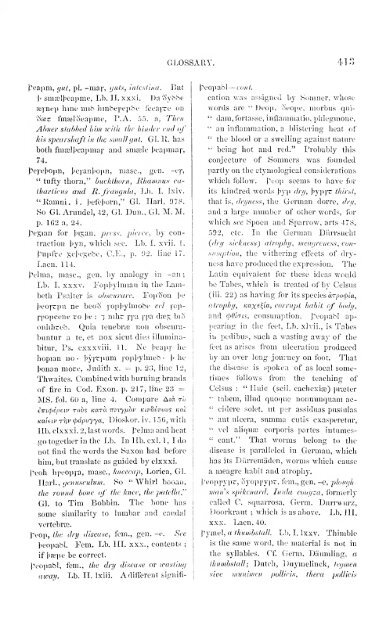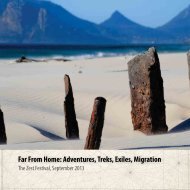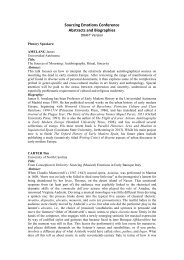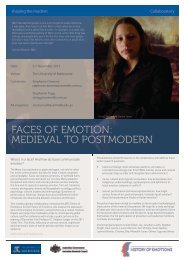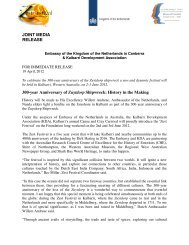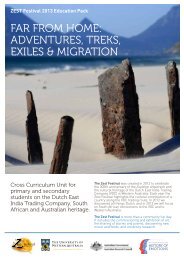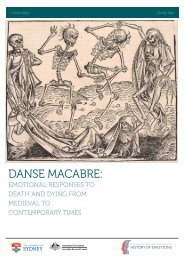Leechdoms, wortcunning, and starcraft of early England. Being a ...
Leechdoms, wortcunning, and starcraft of early England. Being a ...
Leechdoms, wortcunning, and starcraft of early England. Being a ...
You also want an ePaper? Increase the reach of your titles
YUMPU automatically turns print PDFs into web optimized ePapers that Google loves.
;<br />
—<br />
GLOSSARY,<br />
41S<br />
peapm, gut, pi. -ma)*, (juts, intestina. But<br />
i> sm£El}>eapme, Lb. IL xxxi. Da'Sybhe<br />
ajynep hme mib limbe]ie]ibe fceaj.Te on<br />
Saec fmael'Seajime, P.A. 55. a, Then<br />
Ahner stabbed him with the hinder end <strong>of</strong><br />
his spearshaft in the small gut. Gl. R. has<br />
both fma;l{ea]imaj- <strong>and</strong> smajle Jjeajimaj-,<br />
74.<br />
pepejiopn, Jjejanjjojm, niasc, gen. -ej-,<br />
" tufty thorn," buckthorn, Bhamnus catharticus<br />
<strong>and</strong> H.frangula, Lb. I. Ixiv.<br />
"Ramni. i. J^efe'horn," GL Harl. 978.<br />
So Gl. Arundel, 42, Gl. Dun., Gl. M. M.<br />
p. 162 a, 24.<br />
pegian for t>isan, press, pierce, by contraction<br />
Jjyn, -which see. Lb. L xvii. 1.<br />
pupfce seK^sebe, C.E., p. 92, line 17.<br />
Lacn. 114.<br />
pelma, masc, gen. by analogy in -an<br />
lib. I. XXXV. Fojijjylmian in the Lambeth<br />
Psalter is obscurare. Foji'Son J^e<br />
)jeo)'tpu ne beo^' }0]i>ylmobe vel yoy\-<br />
j*]'0]icene to J^e :<br />
T niht )*pa j-pa dasg bi5<br />
onlihceb. Quia tenebraj non obscurabuntur<br />
a te, et nox sicut dies illuminabitur,<br />
Ps. cxxxviii. 11. Ne J^eapy he<br />
hopian no • Jiyj^jnim fojihylmeb<br />
• \> he<br />
Jjonan more, Judith x. = p. 2.3, line 1 2,<br />
Thwaites. Combined with burning br<strong>and</strong>s<br />
<strong>of</strong> fire in Cod. Exon. p. 217, line 23 =<br />
MS. fol. 60 a, line 4. Compare Aia to<br />
eTrt(p4p€ii' Tovs Kara Trviyfihy Kivovvovs Koi<br />
Kai^iv T^v (fxipvyya, Dioskor. iv. 156, with<br />
Hb. clxxxi. 2, last words, pelma <strong>and</strong> heat<br />
go together in the Lb. In Hb. cxl. 1 , I do<br />
not find the words the Saxon had before<br />
him, but translate as guided by clxxxi.<br />
peoh hpeojiya, masc, kneecap, Lorica, Gl.<br />
llarl. ,<br />
ge7iusculum. So " Whirl booau,<br />
the round bone <strong>of</strong> the knee, the patella,"<br />
Gl. to Tim Bobbin. The bone has<br />
some similarity to lumbar <strong>and</strong> caudal<br />
vertebrae.<br />
peop, the dry disease, fern., gen. -e. See<br />
Jjeopabl. Fem. Lb. III. xxx., contents ;<br />
if Jjseiie be correct.<br />
peojiabl, fem., the dry disease or wasting<br />
away. Lb. II. Ixiii. A different signifipeopabl<br />
conl.<br />
cation was assigned by Somner, whose<br />
words are " Deop, '5eo]ie, morbus qui-<br />
" dam,fortasse, inflammatio, phlegmone,<br />
" an inflammation, a blistering heat <strong>of</strong><br />
" the blood or a swelling against nature<br />
" being hot <strong>and</strong> red." Probably this<br />
conjecture <strong>of</strong> Somners was founded<br />
partly on the etymological considerations<br />
which follow, peoji seems to have for<br />
its<br />
kindred words )>j\i dry, J'ypjT thirst,<br />
that is, dryness, the German dorre, dry,<br />
<strong>and</strong> a large number <strong>of</strong> other words, for<br />
which see Spoon <strong>and</strong> Sparrow, arts 478,<br />
592, etc. In the German Diirrsucht<br />
(dry sickness') atrophy, meagreness, consumption,<br />
the withering efi'ects <strong>of</strong> dryness<br />
have produced the expression. The<br />
Latin equivalent for these ideas would<br />
be Tabes, which is treated <strong>of</strong> by Celsus<br />
(iii.<br />
atrophy,<br />
22) as having for its species arpocpia,<br />
Kaxe^ia, corrupt habit <strong>of</strong> body,<br />
<strong>and</strong> (pdiais, consumption, peojiabl appearing<br />
in the feet. Lb. xlvii., is Tabes<br />
iu pedibus, such a wasting away <strong>of</strong> the<br />
feet as arises from ulceration produced<br />
by an over long journey on foot. That<br />
the disease is spoken <strong>of</strong> as local sometimes<br />
follows from the teaching <strong>of</strong><br />
Celsus :<br />
" Huic (scil. cachexiae) prater<br />
" tabem, illud quoque nonnunquam ac-<br />
" cidere solet, ut per assiduas pustulas<br />
" aut ulcera, simama cutis exasperetur,<br />
" vel aliquas corporis partes intumes-<br />
" cant." That worms belong to the<br />
disease is paralleled in German, which<br />
has its Diirremaden, worms which cause<br />
a meagre habit <strong>and</strong> atrophy.<br />
peo]i]'yp-, 'Syo]i]'ypr, fem., gen. -e, plough<br />
man's spikenard.<br />
Inula conyza, formerl}-<br />
called C. squarrosa. Germ. Durrwurz,<br />
Doorkraut ;<br />
which is as above. Lb. III.<br />
xxx. Lacn. 40.<br />
pymel, a thumbstall. Lb. I. Ixxv. Thimble<br />
is the same word, the material is not in<br />
the syllables. Cf. Gemi. Diiumling, a<br />
thumbstall;<br />
Dutch, Duymelinck, tegmen<br />
sive munimen pollicis, theca pollicts


